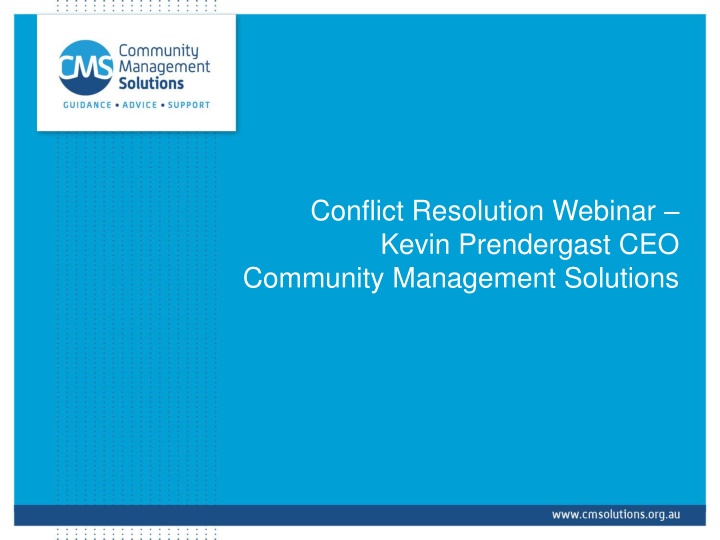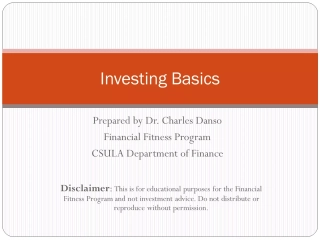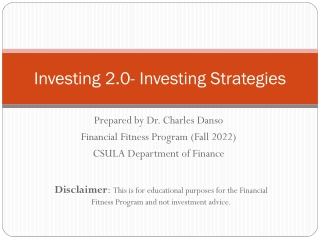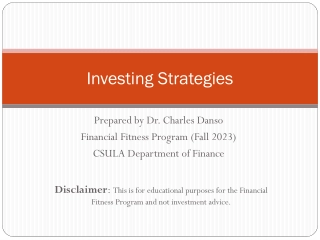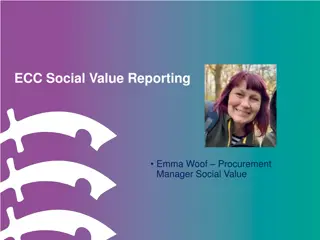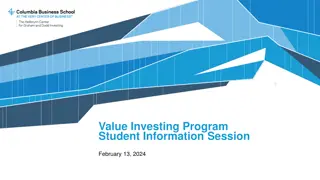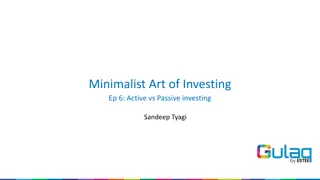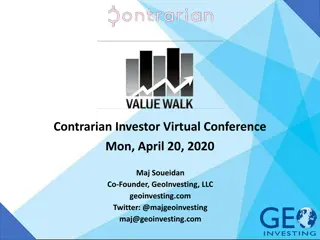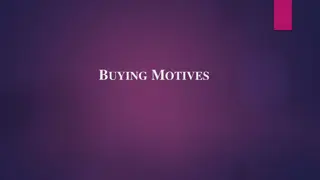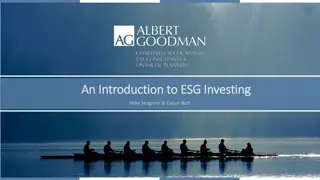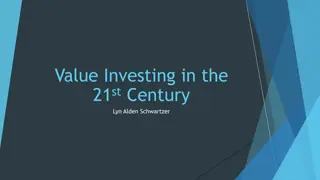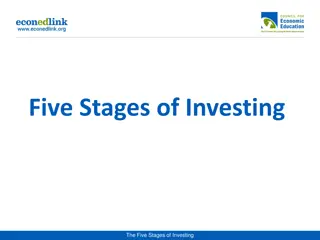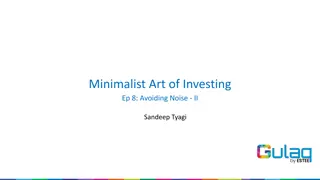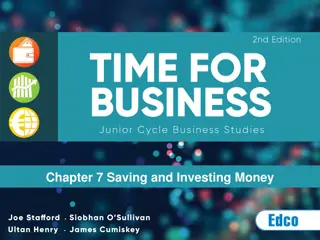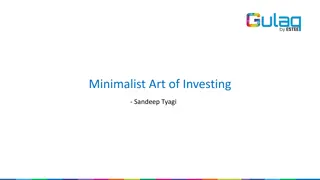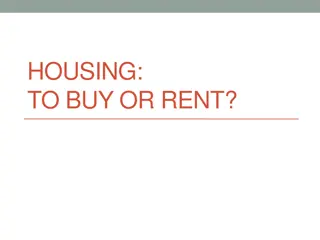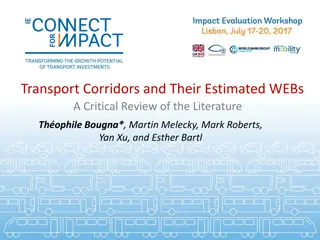Contrarian Value Investing: Buying the Losers
In contrarian value investing, you capitalize on market overreactions by targeting undervalued stocks that have experienced negative news. Studies support the effectiveness of this strategy over the long term, especially with loser portfolios outperforming winner portfolios. However, there are considerations such as transaction costs, skewed returns, and the need for a long time horizon for optimal results.
Download Presentation

Please find below an Image/Link to download the presentation.
The content on the website is provided AS IS for your information and personal use only. It may not be sold, licensed, or shared on other websites without obtaining consent from the author.If you encounter any issues during the download, it is possible that the publisher has removed the file from their server.
You are allowed to download the files provided on this website for personal or commercial use, subject to the condition that they are used lawfully. All files are the property of their respective owners.
The content on the website is provided AS IS for your information and personal use only. It may not be sold, licensed, or shared on other websites without obtaining consent from the author.
E N D
Presentation Transcript
Conflict Resolution Webinar Kevin Prendergast CEO Community Management Solutions
Introduction What is conflict management? How can we develop the skills to be effective? How can we deal with difficult conversation? Strategies to manage and resolve disputes. Look at the different forms of conflict. How to understand the options and the process. Successful tips for Conflict Resolution.
Conflict Complaints, Conflict and Disputes can occur at any workplace. A conflict exists when one or more people disagree about something, and the matter remains unresolved. Disputes may be settled quickly and informally. However, if this is not possible you may have to consider a more formal approach. Best practices infers that we must follow a process which is fair, accountable and transparent. You must take this topic seriously and address issues quickly before escalation occurs.
Conflict Conflict of disagreements are a natural part of society including the workplace. More than likely in fact almost certainly to one degree or another it will occur in every workplace. In fact, conflict is inevitable. However, we need to form a different mindset that being let's treat conflict not as burdensome of inherently difficult rather than an opportunity which presents itself .
Why bother We are all very busy, so why take the time and energy to settle or mediate disputes or try to solve conflict before it escalates: Greater employee productivity through increased job satisfaction. Less mental health issues. Less complaints. Improved employee engagement and retention. Reduced stress for managers and employees. Improved relationships with employees. Reducing and or mitigating costs from resolving disputes externally.
Unresolved conflict Reduced morale. Hindering employee performance. Team dynamic fails. Increase absenteeism. Increased stress. Aggression. Massive decrease in productivity. Devastating impact on service delivery. Increase recruitment costs. Lack of faith in management. Increased claims both internal and external.
Why disputes happen Personality clashes. Misunderstandings. Unresolved problems from the past. Competition between employees. Poor communication. Lack of Leadership. Confusion over responsibilities and roles. Bullying harassment or inappropriate behavior.
Conflict Management Studies show that at least 25% of managers time is related to resolving workplace conflicts. 85% of employees deal with disputes on one level or another. Conflict must therefore be managed, and our people must have the necessary authority, support, guidance, and training to become effective at this skill. Sometimes people see conflict as something to avoid because if can cause discomfort, therefore many choose to ignore the conflict. Conflict can be easy to ignore but this will result in unresolved conflict.
Questions Please ask yourself the following questions, this is a time for the development of one key skill that is self reflection: How do you define conflict? What is your typical response to conflict? What is your greatest strength in dealing with conflict? If you could change one thing about how you deal with conflict what would that be? What is the most important outcome of conflict? What do you do when someone avoids conflict with you? What are some of the reasons you choose to avoid conflict? What are some of the negative consequences of conflict? What are some of the positive consequences of conflict?
How are disputes closed A negotiated outcome, where the parties resolve the issues themselves. A mediated outcome, where an independent mediator helps the parties arrive at their own agreement. An arbitrated outcome.
Recognizing signs of conflict Lack of employee motivation, distracted, not focused. Change in behavior. Decrease in productivity. Absenteeism. Reduction in cultural alignment. Silence in the office. Reduced communication. Increase sick leave.
Skills required Create a simple dispute resolution process: Be consistent. Be quick. Ensure transparency. Ensure an escalation process. Set expectations. Be sensitive. Take all issues seriously. Seek clarification. Avoid jargon. Encourage listening. Have a clear and accessible complaints procedure. Create a workplace culture of trust. Make sure managers understand, and are trained in the procedure. Follow the principles of procedural fairness and natural justice.
Skills Conflict Resolutions skills to use with your team and your customers. The primary skills that you will need include: Negotiation skills Ability to show empathy Emotional Intelligence Communication Impartiality Stress Management
First Steps Identify conflicts. Before you can address a conflict, you must first have the skills to identify that a conflict exists. Be observant on behavior, both verbal and nonverbal, and be focused and look for warning signs. Ask questions, investigate when appropriate, look for clues, read signs of conflict in written correspondence, look at the team dynamics in team meetings and in particular online, track the same for people working from home, ensure the lines of communication remain open. You can feel conflict in people s tone so listen carefully, check on people from time to time. Listen and look closely at team dynamics. Try to avoid individuals being isolated. When a dispute is apparent act quickly and decisively.
Change your mindset Avoid having the mindset that you are going to solve the issue. Think more along the lines that you are going to try and understand each person's viewpoint and perspective about what has occurred. You need to be prepared to accept difference in opinion. See yourself as a facilitator not a solver. Patience is a virtue.
How do individuals resolve conflict Common ways individuals seek to resolve conflict: Competing one own needs are advocated over others, aggressive style of communication with no regard for future relationships. Accommodating opposite of competing, yield to others, trying to be diplomatic, preserving relationship is most important Avoiding if we don t bring it up it will blow over, views go unexpressed, conflict festers Compromising people gain and give in a series of tradeoffs, compromise is not satisfying leads to a lack of trust.
Strategies for deescalating aggression If you have to deal with an aggressive situation, avoid: Being right Overgeneralizing Not listening Stonewalling Blaming Being defensive Mind Reading
Set Boundaries Before attempting to formerly assist with a conflict situation, it is extremely important to set boundaries: Emphasize to everyone involved that the matters or issued being discussed are not personal. Make sure that everyone agrees to keep the discussion confidential. Ask everyone to try and keep their emotions in check, not to interrupt another person who is speaking, to be polite and respectful and not to engage in hurtful remarks or to make untrue or embellished statements.
Basic skills to practice and develop Be calm and set the precedent with your demeanor. Active Listening- probably the most misunderstood skill utilized by the HR or Management practitioner, is to develop the skill to truly listen to what is being said, and most importantly, having the capacity to understand the information. You must focus on being attentive, do not let your mind wander to other questions that need to be asked or to go on another tangent or train of thought. Ask clarifying questions, paraphrase, and focus on the persons goals and perspective.
Patience It is not simple to overcome or assist with conflict, it can be difficult and time consuming, so patience is imperative, and you must put some conscious thought process before you start that you will demonstrate patience during the process. People don t like to be wrong, and you may have two completely opposing views which may not be able to be resolved without tenacity and effort. If you rush to find a resolution even if it is an obvious one, then people may feel that they have been left out of the decision-making process. Remember we are looking for a long term solutions that everyone can live with and hopefully move on with a sense of closure.
Positivity Be conscious of bringing a positive mindset to the equation as this will assist in keeping the conversation and discussion moving in the right direction. This will also have an impact on all the participants, and make them feel more at ease during the process with a degree of optimism that is generated from your positivity that this will be a worthwhile exercise which will lead to an agreed outcome.
Impartiality Being impartial and having an open mind with no preconceived ideas on outcomes will put you in the best position to be successful. This will allow you to stay focused on the issue itself as this is extremely important and not to allow the discussion to go elsewhere. Focus on the actual issues at stake (the problem) and not on the individuals or their personalities.
Emotional Intelligence Developed primarily through experience, and is the ability or capacity to perceived other people's emotions, but also more importantly, your own emotions and how you are reacting to a situation. What are your individual trigger points to be aware of? Control of guidance of the emotional stimulus will assist in trying not to escalate the issues. We need to guide to a solution based on logic and not on emotions such as anger and frustration.
Continued Communication During and after the session. We need to ensure that we demonstrate and support open communication at all times, but in particular when the issue has been resolved in an attempt to repair the relationship. This will ensure that the agreement or resolution has legs and can be maintained. You must prove to the participants that you understand their side, you may have to acknowledge depending on the circumstances that you are part of the problem and try again if at first the conversation or discussion was not successful.
Extra Tips Pay close attention to nonverbal communications. Know when to apologize. Know when not to apologize. Look for the cause. We want to repair if possible or at least be aware of the importance of the relationship moving forward. Focus on this issue not other ones concentrate on the scope. Don t take anything personally. Offer complements when appropriate. Don t point out guilt or blame. Show a willingness to compromise and collaborate. Show empathy. And above all deal with the issue early.
What can we do to help Community Management Solutions. One of our extra services is in the form of facilitated discussion where one of our people will attend and facilitate a conflict resolution session for you, the advantage of which is that we are independent, and have no bias or preconceived ideas. We can also hold a face-to-face workshop where we can go into much more detail including some fun conflict management games to practice these skills, if that is something that you or your team would be interested in then please give me a call to discuss. Closing, questions and thank you
